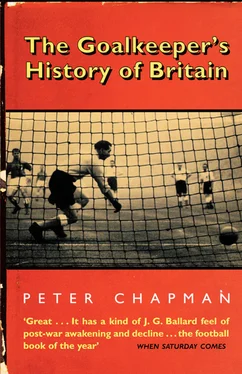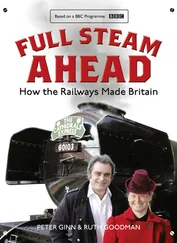But their antics were understandable. In their historical rivalry with England, the Germans had adjusted to a low level of expectation. This goal was a goal, after all. It was the first, too, they had scored on home soil against England since the war. They had not won, they were not near achieving even a draw, but here in Berlin a German crowd had witnessed for themselves that they were at least back on the score sheet. The camera zoomed in on the crowd and people beamed, waved and roared straight back into it. They could have been shouting as one: ‘We’ve had your aid and your Marshall Plan, and we’ve even won the World Cup. But now we’ve landed one back on you, you watch us really get going with that post-war revival.’
They had also not merely scored a goal against England. For almost ninety minutes the Germans had bombarded us, only to be kept out by a characteristic last line. Their solitary success was futile as far as the result was concerned but, at last, they had managed to get something past a typically great British goalkeeper. For a German or any foreign crowd, this was worth celebrating.
Chapter 2
More Flash than Harry
My dad had played in goal when he was at school: ‘Always good with my own company,’ he said. From a country family of seven brothers, his two nearest in age died very young and he was used to getting on with things on his own. At the age of eight he suffered paralysis and nearly died from what people came to believe was polio. Over a period of weeks he fought a lone and fevered battle with the question of whether he was to drop off this mortal coil. The family and the town doctor didn’t expect him to survive. When he did, by their and his own reckoning, he had been those few yards beyond normal experience.
He liked goalkeeping for its occasional spectacular moments. At such times you went through the air knowing you were going to save what, to teammates and opposition alike, was an unstoppable shot bound for the corner of your net. The coordination of mind and body was enough to make you smile, even laugh, as you experienced it. But, overall, it was best not to flaunt things. They had to be done properly; in other words, not overdone. The best keepers were ‘spectacular but safe’.
In British goalkeeping, the first half of the 1930s was the era of Harry Hibbs of Birmingham City. Over five years Harry won twenty-five caps for England, seeing off all challengers for the position. He presided over a period which consolidated the British tradition of goalkeeping, and one which built on foundations laid by two keepers whose heyday just preceded his own. The weighty Encyclopaedia of Sport I received one Christmas, published by Messrs Sampson Low, Marston and Co. for the children of the kingdom, dominions and empire, cast its magisterial gaze back some forty years to pronounce that ‘among the greatest of all time’ was Sam Hardy of Liverpool and Aston Villa. Hardy had been England’s goalkeeper before and after the First World War and had a gift of calm judgement. As the opposition bore down on his goalmouth he was ‘invariably in position when the shot was made’.
When Hardy was transferred to Aston Villa in 1912, he was succeeded at Liverpool by Elisha Scott, from the north of Ireland. Scott ‘was strangely like him’ and ‘positioned well’. Over seventeen seasons to 1936 he played in thirty-one internationals, a number restricted because united Irish and (after partition) Northern Irish teams played games only within the British Isles. But Scott’s appearances remained a record till the Spurs captain and half-back Danny Blanchflower outnumbered them in 1958, when Northern Ireland teams were travelling the continent and playing in World Cups. In Scott’s time there was no need to travel for his skills to be put to the sternest test. ‘At times he defied the might of England single-handed’, said my encyclopaedia. There were few greater laurels it could have tossed at the man. British keepers were expected to be a match for the world; to defy England took something really special.
Both Hardy and Scott had another factor in common which qualified them for the ranks of the greatest. This was that they made no obvious claim for the title. They carried out their goalkeeping in a serious manner, motivated by the ideal of avoiding anything remotely extroverted. Much of Hardy’s brilliance lay in the fact that he was ‘hardly noticed on the field’. He was ‘as unspectacular in goal as he was quiet and modest off it’. Scott, too, was ‘modest and quiet’ with ‘nothing of the showman about him’.
Their way was in contrast to the keeper at the top of the profession in the period before them. At the turn of the century, the confidence of Victorian empire-building had swollen out of control in the shape of Billy ‘Fatty’ Foulke. Tall for his time at 6 feet or so, Foulke weighed in across a scale of 20–24 stone. In his career for Sheffield United, Chelsea and England, Foulke threw and otherwise put himself about, intimidating opponents and authorities alike. He stormed after referees to hammer on their dressing-room doors, if decisions had not gone his way. An increasingly bloated figure, his retirement was blessedly timed for Britain’s approach to the First World War. Hardy and Scott provided the mould of those going to fight it. Millions filed into the trenches of France and Belgium to stand and wait, and to be ‘invariably in position when the shot was made’. Sam and Elisha dutifully served the cause of being the first of the type: the British keeper as the goalmouth’s humble ‘custodian’.
Harry Hibbs followed in their stead, unflappably pursuing a one-club league and Cup career of over 400 games. His first international came in 1930, the year after some shocks to the system. As if the Wall Street Crash was not enough, England’s first defeat abroad deepened the depression. It was one thing to be beaten by the Scots – twenty-four times between 1872 (when the first match between the two countries was staged) and 1929 made this reasonably common; it was quite novel to be humbled by the ‘continentals’. In the game we had invented, Spain did the dirty, 4–3 in Madrid. This was equivalent to bullfighting’s finest rolling up at Wembley from the estancias of Castille, to be humiliated by a squad of upstart toreros from the backstreets of Huddersfield. Previous English excursions abroad had been mainly confined to taking the steamer across the Channel to France or Belgium. We took our own matchballs to counter the likelihood of foreign jiggery-pokery. How the Spaniards had won the match was a source of national perplexity.
Hibbs was cannily suited to handle the uncertainties of the epoch, a man to lift the spirit by steadying the nerves. My encyclopaedia approved his style as a subtle variation from that commended by my father. Harry was ‘safe rather than spectacular’. At 5 feet 9 inches, ‘on the short side for a goalkeeper’, he compensated by refining the brilliance of Sam Hardy to still higher levels. Hibbs was not just in position for assaults on his goal, but in the only possible position: ‘He gave the impression that forwards were shooting straight at him.’
There was something very British about this knack. It was a natural detachment from the turmoil that enabled ultimate control of it. Britain in the 1930s had withdrawn into itself, in an understated, poor man’s version of the old and sensible glories of ‘Splendid Isolation’. As Harry Hibbs surveyed the scene from his goalmouth, the nation observed gathering continental chaos. Hitler and Mussolini strutted and pranced around. Britain did not have the faintest idea what to do. This could not be easily admitted, least of all to ourselves, so it was important to conjure up the sense of a nation being quietly ‘there’, in the right place should the need arise. Hibbs personified the being there. Like Britain, he was also particularly good whenever required to face the strutters and prancers. Harry’s skills were most marked, said my encyclopaedia, ‘against a continental side which included a showy keeper’.
Читать дальше












